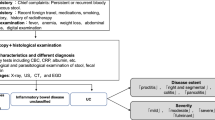Abstract
Probiotic bacteria exhibit a variety of properties, which are unique to a particular strain. Lactobacillus acidophilus-SDC 2012, 2013 are new strains isolated from Korean infants’ feces. The potential utility of Lactobacillus acidophilus-SDC 2012, 2013 in irritable bowel syndrome (IBS) was studied. Forty IBS patients were randomized into a placebo (n = 20) and probiotics group (n = 20). Four weeks of treatment with L. acidophilus-SDC 2012, 2013 was associated with a reduced score for abdominal pain or discomfort compared to the baseline (P = 0.011). The percent reduction in abdominal pain or discomfort exceeded the placebo scores by more than 20% (23.8 and 0.2% for probiotics and placebo, respectively, P = 0.003). There was a significant difference in the proportion of responders between the probiotics and placebo groups (P = 0.011). There was no drop out or adverse events for either group during the study period. Lactobacillus acidophilus-SDC 2012, 2013 appeared to have a beneficial effect in patients with IBS. Further studies are warranted.

Similar content being viewed by others
References
Schrezenmeir J, de Vrese M (2001) Probiotics, prebiotics, and synbiotics–approaching a definition. Am J Clin Nutr 73:361S–364S
Floch MH, Madsen KK, Jenkins DJ, Guandalini S, Katz JA, Onderdonk A, Walker WA, Fedorak RN, Camilleri M (2006) Recommendations for probiotic use. J Clin Gastroenterol 40:275–278
Quigley EM, Flourie B (2007) Probiotics and irritable bowel syndrome: a rationale for their use and an assessment of the evidence to date. Neurogastroenterol Motil 19:166–172
Nobaek S, Johansson ML, Molin G, Ahrne S, Jeppsson B (2000) Alteration of intestinal microflora is associated with reduction in abdominal bloating and pain in patients with irritable bowel syndrome. Am J Gastroenterol 95:1231–1238
Niedzielin K, Kordecki H, Birkenfeld B (2001) A controlled, double-blind, randomized study on the efficacy of Lactobacillus plantarum 299V in patients with irritable bowel syndrome. Eur J Gastroenterol Hepatol 13:1143–1147
Kim HJ, Camilleri M, McKinzie S, Lempke MB, Burton DD, Thomforde GM, Zinsmeister AR (2003) A randomized controlled trial of a probiotic, VSL#3, on gut transit and symptoms in diarrhoea-predominant irritable bowel syndrome. Aliment Pharmacol Ther 17:895–904
O’Mahony L, McCarthy J, Kelly P, Hurley G, Luo F, Chen K, O’Sullivan GC, Kiely B, Collins JK, Shanahan F, Quigley EM (2005) Lactobacillus and bifidobacterium in irritable bowel syndrome: symptom responses and relationship to cytokine profiles. Gastroenterology 128:541–551
Rhee PL (2006) Definition and epidemiology of irritable bowel syndrome. Korean J Gastroenterol 47:94–100
Longstreth GF, Thompson WG, Chey WD, Houghton LA, Mearin F, Spiller RC (2006) Functional bowel disorders. Gastroenterology 130:1480–1491
Heaton KW, Radvan J, Cripps H, Mountford RA, Braddon FE, Hughes AO (1992) Defecation frequency and timing, and stool form in the general population: a prospective study. Gut 33:818–824
Irvine EJ, Whitehead WE, Chey WD, Matsueda K, Shaw M, Talley NJ, Veldhuyzen van Zanten SJ (2006) Design of treatment trials for functional gastrointestinal disorders. Gastroenterology 130:1538–1551
Wilson A, Longstreth GF, Knight K, Wong J, Wade S, Chiou CF, Barghout V, Frech F, Ofman JJ (2004) Quality of life in managed care patients with irritable bowel syndrome. Manag Care Interface 17:24–28, 34
Longstreth GF, Wilson A, Knight K, Wong J, Chiou CF, Barghout V, Frech F, Ofman JJ (2003) Irritable bowel syndrome, health care use, and costs: a U.S. managed care perspective. Am J Gastroenterol 98:600–607
Camilleri M (2006) Probiotics and irritable bowel syndrome: rationale, putative mechanisms, and evidence of clinical efficacy. J Clin Gastroenterol 40:264–269
Ringel-Kulka T, Ringel Y (2007) Probiotics in irritable bowel syndrome: has the time arrived? Gastroenterology 132:813–816; discussion 816
Riordan SM, Kim R (2006) Bacterial overgrowth as a cause of irritable bowel syndrome. Curr Opin Gastroenterol 22:669–673
Sharara AI, Aoun E, Abdul-Baki H, Mounzer R, Sidani S, Elhajj I (2006) A randomized double-blind placebo-controlled trial of rifaximin in patients with abdominal bloating and flatulence. Am J Gastroenterol 101:326–333
Kajander K, Hatakka K, Poussa T, Farkkila M, Korpela R (2005) A probiotic mixture alleviates symptoms in irritable bowel syndrome patients: a controlled 6-month intervention. Aliment Pharmacol Ther 22:387–394
Camilleri M (2006) Is there a role for probiotics in irritable bowel syndrome? Dig Liver Dis 38(Suppl 2):S266–S269
Acknowledgement
Financial support: The authors were supported, in part, by grants from the Seoul Research and Business Development Program (No. 10582).
Author information
Authors and Affiliations
Corresponding author
Rights and permissions
About this article
Cite this article
Sinn, D.H., Song, J.H., Kim, H.J. et al. Therapeutic Effect of Lactobacillus acidophilus-SDC 2012, 2013 in Patients with Irritable Bowel Syndrome. Dig Dis Sci 53, 2714–2718 (2008). https://doi.org/10.1007/s10620-007-0196-4
Received:
Accepted:
Published:
Issue Date:
DOI: https://doi.org/10.1007/s10620-007-0196-4




